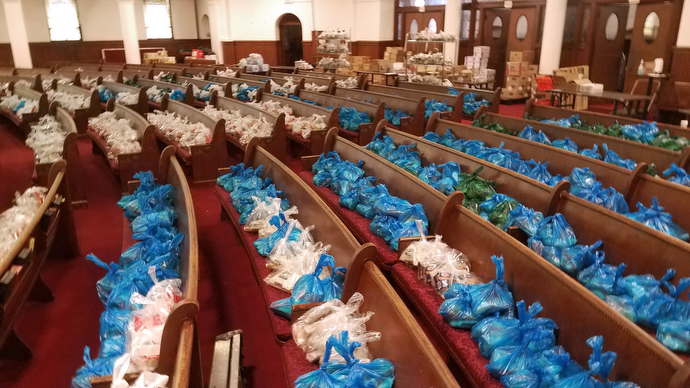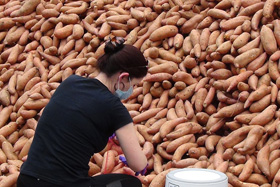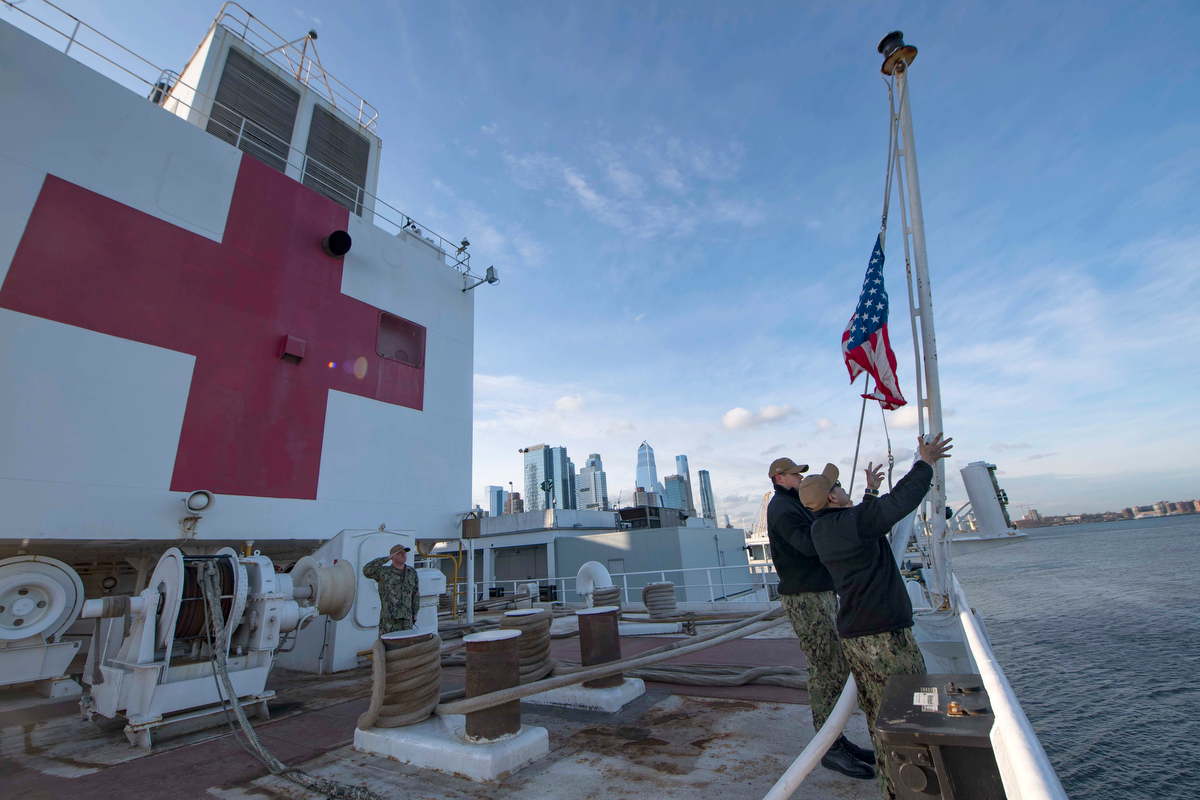United Methodists in New York and New Jersey are grappling with the unwanted distinction of living at the epicenter of the coronavirus pandemic in the U.S.
Once the crisis has passed, their episcopal leaders believe, life in the region will never quite be the same.
“This is our new 9/11 in New York,” declared New York Area Bishop Thomas J. Bickerton. “What we discovered from 9/11 is we didn’t go back to the way it was before.”
Greater New Jersey Area Bishop John R. Schol calls this time “a defining moment for the church and who the church is and who the church will be in the future.” He also believes the impact of the COVID-19 crisis will help shape the future of The United Methodist Church.
On West Coast,
a glimmer of hope
United Methodist Bishop Elaine JW Stanovsky, based in the Seattle area, believes measures involving stay-at-home orders, physical distancing, the banning of gatherings and events and closing of businesses and schools are paying off.
In Sacramento, California, the Rev. Jorge Domingues, executive director of connectional ministries for the denomination’s California-Nevada Conference, also credits early action for moderating the potential caseload in that state.
As of April 3, there were 245,573 confirmed coronavirus cases in the U.S., according to the Johns Hopkins Coronavirus Resource Center. The New York Times was reporting 92,770 cases and 2,635 deaths in New York State. New Jersey has the second-highest number of cases, at 25,590, with 539 deaths.
“If New York and New Jersey were nations, New York would be No. 5 in the world and New Jersey would be No. 8 in terms of the number of cases,” said Schol, acknowledging the enormity of the situation. “It’s pretty significant and pretty challenging.”
Another challenge — and sorrow — for Christians is not being able to observe Holy Week and celebrate Easter in traditional ways. Bickerton pointed out that combining the Easter message of life, hope and resurrection with the Wesleyan heritage of social holiness means advocating for life by staying at home and following advice designed to slow the infection rates.
In New York City, no worship is taking place at the United Methodist Church of St. Paul & St. Andrew. But a vital mission remains, which is filling the pews of the sanctuary at West 86th Street and West End Avenue.
The West Side Campaign Against Hunger — a supermarket-style food pantry program founded and actively supported by St. Paul and St. Andrew — has moved its operations there from the basement’s fellowship hall. While the organization has been forced to temporarily drop its direct engagement to promote self-reliance for customers, it can still distribute shelf-stable food through its mobile sites and 86th Street locations, says Greg Silverman, executive director.
“We just needed a massive increase in space to put all that food together,” he explained. “The sanctuary is set up in some ways for that because we can create rows of food in some pews. At the same time, it allows for social distancing because people can work in remote corners of that huge space.”

While less community-focused, the campaign against hunger’s current operations are working like clockwork, Silverman said, while allowing people to be safe. “In some ways, it plays to all of our strengths,” he added. “We’re used to prepping and organizing huge quantities of food for upcoming events.”
Starting the week of April 6, their operations will expand into the church’s chapel and parlor as they begin bagging food for Bellevue Hospital in Manhattan. The result will be 1,750 sets of food each week, given to COVID-19 patients leaving the hospital.
In Queens, the borough with New York City’s largest rate of infection, First United Methodist Church in Flushing has donated handmade face masks to two senior living communities. The goal is to donate 10,000 masks, said the Rev. Chongho Kim.
“We hope these small acts of sharing will gain momentum and continue to unfold, encouraging people to overcome the pandemic with love,” he said.
United Methodists in the region realize that they are, in a sense, “on the frontier” and can share learnings and strategies with churches in other parts of U.S. as the coronavirus crisis continues, noted the Rev. Matt Curry, director of connectional ministries for the New York Conference.
While few have experienced such a crisis, “what we do have are the networks… and the ability to connect,” he said.
Even small rural churches in the conference are finding creative ways to respond, Curry and Bickerton said.
Addressing food insecurity

“I think they’ve discovered a new sense of life and purpose,” the bishop explained. “We’re hearing a lot of really positive stories out of our small membership churches.”
Despite “the joy in the struggle” and blessings discovered by chance in this new reality, the inability to gather or to be physically present to provide comfort or assistance is hard for everyone to deal with.
“Almost every natural pastoral instinct has been taken away from our clergy,” Bickerton said.
Finding new ways to guide those instincts has been a focus for the Greater New Jersey Conference. Schol and his staff are addressing the challenges imposed by the pandemic by working the connection: providing resources and support to clergy, who do the same for their congregations, who then reach out to their communities.
“A lot of our clergy have been helping each other and that’s just been wonderful to see,” the bishop added. The conference has more than 900 active and retired clergy.
But it is sobering to watch the increase in the daily statistics. The conference already has experienced the deaths of a clergy member and the son of a pastor, with several parishioners and others, including a district superintendent, currently hospitalized with the virus.
“People are very afraid, people are anxious, people are lonely and people are just searching for answers,” the bishop said.
Subscribe to our
e-newsletter
As in New York City, density is a risk factor — New Jersey is the most densely populated state in the nation, Schol said. Living with 300 or 400 other people in an apartment building with closely shared common spaces, for example, can heighten the anxiety. “I had one pastor say to me, ‘My parishioners won’t even open their doors,’” the bishop reported.
The Greater New Jersey Conference set a goal to be a model for both church and community during the coronavirus crisis. Schol said part of that goal “is that there would be zero infections because of the United Methodist activity.” Setting that goal, he added, has helped clergy and church members re-evaluate before engaging in what could be risky behavior.
Working with the community at times of disaster already was part of the conference’s DNA. The organization it built in response to Superstorm Sandy in 2012 — A Future with Hope — had transitioned into community development work. But the bishop said the conference had always “kept a piece of it as our disaster response.”
What the federal and state disaster response coordinators want is for churches “to practice one-on-one assistance” with appropriate social distancing, to take care of the needy, elderly or disabled in a congregation or neighborhood where the church is located, said Rick Reinhard, executive director of A Future With Hope. “That’s not an easy word to get out there,” he admitted.
“It’s very different from the typical disaster where people gather (to help). That’s very difficult for people to process,” Reinhard said. “We’re re-inventing how we’re working on it every day.”
A Future With Hope is providing information on such topics as social distancing techniques, new regulations for food pantries and transportation restrictions. One of the organization’s staff, Tara Maffei, “plays an instrumental role” in six statewide disaster response committees and task forces, he said. She also monitors information that comes from the governors of New Jersey, New York and Pennsylvania.
Another legacy from Superstorm Sandy is proving useful, Reinhard noted. Recently, Tom O’Hearn, the conference’s disaster response coordinator, realized there were hundreds of leftover masks in storage sites throughout the state.
“He has been working on gathering those masks and donating them to area hospitals,” he said. They have been very much appreciative.”
Bloom is the assistant news editor for United Methodist News Service and is based in New York. Thomas Kim contributed to this story.
Follow her at https://twitter.com/umcscribe or contact her at 615-742-5470 or newsdesk@umcom.org. To read more United Methodist news, subscribe to the free daily or weekly digests.
Like what you're reading? Support the ministry of UM News! Your support ensures the latest denominational news, dynamic stories and informative articles will continue to connect our global community. Make a tax-deductible donation at ResourceUMC.org/GiveUMCom.




